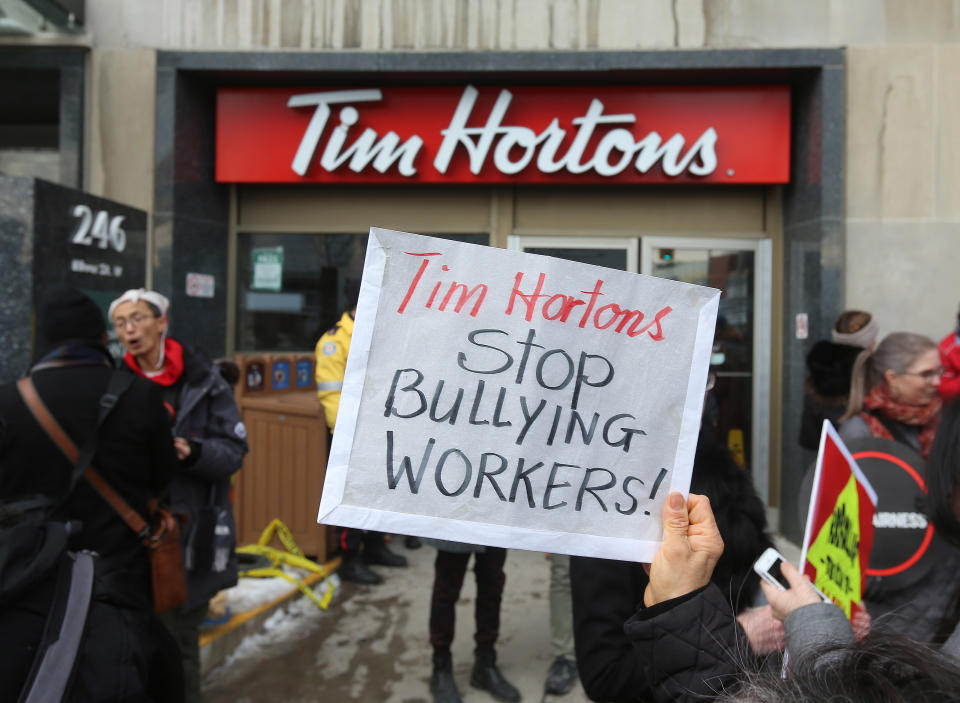Tim Hortons owner tops RBC list of ‘growth and cash fountain’ restaurant stocks

The parent company of Tim Hortons will outperform its restaurant rivals after a year marked by reputational fallout at the famed Canadian coffee and doughnut chain, according to RBC Capital Markets.
Restaurant Brands International Inc. (QSR) tops RBC’s restaurant stock rankings for 2019. Analyst David Palmer set a $70 one-year price target on shares of the Oakville, Ont.-based company in a report published last week.
New York-listed shares fell 2.32 per cent to $51.12 on Thursday at 1:04 p.m. E.T.
RBC’s endorsement comes on the heels of a turbulent year for the Tim Hortons brand that saw an outspoken franchisee stripped of restaurants, and demonstrations by workers over slashed benefits in Ontario.
“We are encouraged by visible drivers of improvement at Tim Hortons Canada, and believe that franchisee relations and morale have improved considerably since early 2018,” Palmer wrote. “We estimate that an investment in QSR stock could generate a total implied return over 100 per cent over the next five years.”
Throughout 2018, a franchisee group claiming to represent more than half of store operators was a bitter thorn in the company’s side.
The Great White North Franchisee Association’s (GWNFA) complaints included rising food and packaging costs, mismanaged advertising funds collected from store operators, and the impact of a minimum wage hike in Ontario.
The rocky relationship between RBI and the franchisee group escalated in September when the company seized four Alberta locations operated by GWNFA president David Hughes. RBI alleged that Hughes leaked corporate information to the media. Hughes denied the allegation.
The two parties are said to have settled for an undisclosed amount after Hughes considered seeking a court injunction to get his restaurants back.
RBI chief executive officer Daniel Schwartz said in August that the company implemented biweekly all franchisee calls to discuss an initiative called the Winning Together Plan. The strategy was designed to improve profitability for the company’s restaurant owners, while curbing negative attention.
Tim Hortons didn’t brew up positive attention in the U.S. either, ranking dead last in an RBC Capital Markets survey assessing American consumers’ top quick service restaurant choices. Tim Hortons operates more than 600 stores in 14 U.S. states.
‘Growth and cash fountains’
RBI’s roster of eatery chains also includes Burger King and Popeyes Louisiana Kitchen. Palmer is calling for more Popeyes stores to open internationally, stronger same-store-sales and “more premium offerings” at Burger King, and improvements related to all-day breakfast, kids meals and a loyalty program at Tim Hortons.
“M&A could also be an additional source of upside into 2019/2020,” Palmer wrote.
The report strikes an upbeat tone on the broader restaurant sector as well, noting both fast food and casual dining shares stand to benefit from a robust U.S. economy and emerging market consumer trends.
“The restaurant sector has delivered a nine per cent weighted average stock upside this year (versus the S&P 500’s minus five per cent),” Palmer wrote. “These growth and cash fountains represent a superior late-cycle choice to many staples names, in our view.”
RBC Restaurant sector stock rankings into 2019
Restaurant Brands International
Darden Restaurants
Noodles & Co.
Chipotle Mexican Grill
McDonald’s Corporation
Yum! Brands
Starbucks Corporation
Brinker International
Texas Roadhouse
Dunkin’ Brands Group
The Wendy’s Company
Download the Yahoo Finance app, available for Apple and Android.

